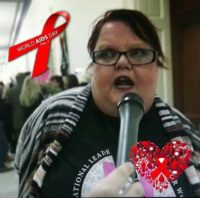July 31, 2018: Much like HIV, mental illness has always been a taboo topic in every society. It will come as no surprise to most people living with HIV that these two, far too often, come together—a double dose of stigma. It can be very hard to open up about either, let alone both. Many of the stories are heartbreaking and distressing.
Francine
Francine is 53 years old and loves to travel, read, craft, and shop–doing different kinds of creative work, especially scrapbooking. She was diagnosed with depression shortly after her mother died and just before her HIV diagnosis. She explained that when she was diagnosed with depression, she was in complete denial and was mad at her doctor for prescribing medication. “Before the diagnosis, I honestly just felt that I just had a bad case of the ‘blues’ that showed up now and again. I never really considered that I was depressed until my doctor diagnosed me,” she explained.
In addition to this, Francine describes how HIV was not the source of her depression, but rather the loss of her mother and cousin, who both died in the same year.
As a member of a support group on Facebook, Francine said she has received support and encouragement from many who have similar stories. Together, they have shared their innermost worries and fears. “We are supportive of one another and encourage those experiencing depression to reach out to any of us individually and/or seek the assistance of a licensed therapist to ‘talk it out’ if need be,” said Francine.
Also, Francine is very thankful to her medical team, who take very good care of her welfare and health and regularly give her helpful advice on what to do about her therapy. “Right now, we are going to see if the change of my HIV meds will help reduce my depression and if not, we’ll revisit putting me back on the happy pill.”
Even though Francine is estranged from her family, the ones who really cheer her up and help her think positive are other women living with HIV. “It is a shared experience among all of us and we often share frustration in those who don’t ‘get it’,” she explained. “There are times, depending on how far down the depression rabbit hole I have fallen that I am able to pray, think positive…give myself a pep talk or call one of them and the depression goes away. Sometimes, it works, but often, as soon as I hang up or if we’re all together, I go home…the symptoms return.”
Fracine agreed that the topics of HIV and depression, together or separately, are both highly stigmatized. “Nobody wants to be seen as ‘crazy’ when getting help for their depression and certainly nobody wants to be associated with HIV! I was one of those people who believed as some of my friends and family still do, that I could ‘pray’ my way out of my feelings. It took a long time for me to get to the point of realizing prayer was not enough.”
Marco
Marco Castro-Bojorquez is a talented Mexican film director whose works deal with LGBT rights, immigration and HIV. Castro-Bojorquez also agrees with Francine when it comes to the level of stigma that exists among people struggling with mental health issues.
“The support for people with mental health issues and HIV is almost non-existent,” he said. “I think most people right now are dealing with mental health issues and most of them have not gotten proper care. Unfortunately, a lot of brothers and sisters who are living with HIV and mental health live in pain.”
 He said he did not receive the care and support he thought he would receive from his doctor. “In my case, after several months of dealing with depression, I started to self-medicate with sleeping pills and other drugs–anything that would help the pain. I told my doctor this, and without being specific, he changed the way he treated me and how he behaved. He focused more on the drugs rather than the root cause of my depression.”
He said he did not receive the care and support he thought he would receive from his doctor. “In my case, after several months of dealing with depression, I started to self-medicate with sleeping pills and other drugs–anything that would help the pain. I told my doctor this, and without being specific, he changed the way he treated me and how he behaved. He focused more on the drugs rather than the root cause of my depression.”
When it comes to his friends, most don’t understand how crucial it is to include mental health as an illness, rather than ignoring it. “Sometimes, when I tell my friends that I am sick, they ask me ‘Sick as in a stomach ache or your depression?’ I have to then explain to them how mental health is also an illness. They all see it in a different way and even think about it differently.”
“Give yourself love and care.”
Castro-Bojorquez said he cannot possibly give anyone advice who is struggling with mental health, since everyone has their own issues, worries and sadness that each has to deal with. However, he sends a message of solidarity to all: Everyone should remind themselves to be whatever they wish to be; we are all human and perfect in our own imperfections.
“For me, I like sad stories and music. I don’t think of it as sad, but rather sensitive. I have my own little ceremonies I do on a daily basis, where I look at the stars and the moon. Last night, the moon was beautiful. I ask my mom and dad for strength.”
Lisa
Lisa Johnson-Lett makes sure she spends all of her free time with her beautiful, big family; she has two daughters, 21 and 25, and two grandchildren, a 6-year-old boy and a 5-year-old girl. Her family means a lot to her, and she always makes sure they regularly see and hear from each other. “We plan outings at least once a month – Dave and Busters in Atlanta, Six Flags Amusement Park, dinner or brunch. Every holiday is spent together cooking and eating!” she said proudly.
She was first diagnosed with depression in 1995 upon receiving her HIV diagnosis. From then on, her life started to drastically change. “I felt that I was not good enough, worthy–I had low self-esteem and I didn’t like myself. I didn’t feel pretty on the inside so it reflected my outward appearance. My physical strength, and spiritual wellness were dampened. I used to be able to run and pass all my physical fitness (PT) tests but afterwards, I continued to gain more weight and was scoring low on each PT test,” specified Johnson-Lett.
She said HIV and depression is definitely a topic that many don’t want to talk about since many believe it does not exist. Ever since she was diagnosed with HIV, she knew that it caused her to have depression. “Just testing positive for HIV is a heavy weight. And it causes relationship barriers, not only in intimate-partner relationships but just with friends-associates-employees/employers- family members and just with people in general. Its undue stress trying to hide doctor prescriptions, appointment slips, brochures and HIV informational handouts,” she explained.
Even though Johnson-Lett is aware of how HIV and depression can be connected, she still does not talk about this subject because of the shame.
“Many feelings I have are suppressed feelings of hurt. I am depressed because HIV hurt me and I will never be the same. I am depressed because I am still hurting. Not many know that I struggle and sometimes I don’t even know I struggle because I’ve been faking it until I make it because of the type of work I do,” she described.
Alicia
Alicia Diggs is currently completing her doctoral studies in public health and for years has been an HIV advocate. Diggs opened up for PWN-USA about her diagnosis and what was it like to face HIV and depression.
 “In the beginning of my HIV diagnosis and before I was actually diagnosed in with depression in 2010, I knew my depression stemmed from the diagnosis and my failed marriage,” said Diggs. “I was educated on HIV and how it is contracted, but I did not expect to have an HIV diagnosis after I waited and kept myself for my husband, or for him to later tell me boldly that he knew he had AIDS and didn’t care that he transmitted the virus to me knowingly.”
“In the beginning of my HIV diagnosis and before I was actually diagnosed in with depression in 2010, I knew my depression stemmed from the diagnosis and my failed marriage,” said Diggs. “I was educated on HIV and how it is contracted, but I did not expect to have an HIV diagnosis after I waited and kept myself for my husband, or for him to later tell me boldly that he knew he had AIDS and didn’t care that he transmitted the virus to me knowingly.”
She has spoken to other people about HIV and depression, and they regularly talk to each other and give each other advice on how to go on in hard times. One of her greatest supports are her church family, friends and immediate family.
Luckily, no one has discriminated against Diggs because of her diagnosis, but many have asked questions, have done research about this topic and started to raise awareness.
Olga
 Olga Irwin from Youngstown, Ohio, was diagnosed with depression and anxiety when she was diagnosed with HIV in 1999. She started to have worrisome thoughts about her future.
Olga Irwin from Youngstown, Ohio, was diagnosed with depression and anxiety when she was diagnosed with HIV in 1999. She started to have worrisome thoughts about her future.
“At first it was about wondering and worrying about when and how I would die. Every time I get sick or overwhelmed, I wished I would die fast and with little pain. I always feel tired; the most depressed I have felt over the year and the hardest hit is recently,” said Irwin. “I have been really trying to deal with the depression since December 2017 and still today.”
Irwin said and has opened up to her friends about her situation, explaining how they’ve been her greatest support. To Irwin, she feels that it is important to trust someone in order to really open up about this issue.


